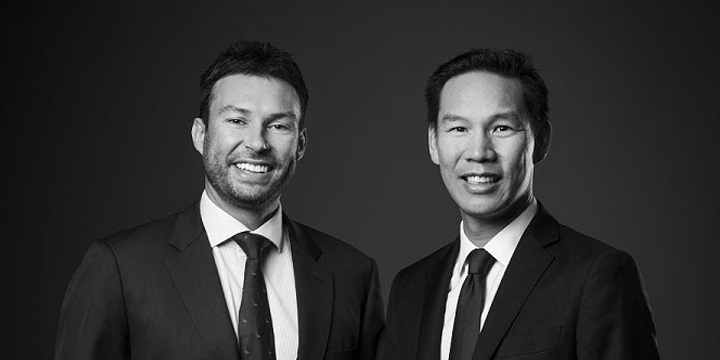Given the recent volatility on share markets as a result of the coronavirus (COVID-19), we wanted to update our fellow investors on our current thoughts on markets and the portfolio activity we are taking within the Global Opportunities Fund.
1. The importance of our business model and the Fund structure in times like these
We, as a team at Ophir, are very positive about the opportunities on offer during this current significant and sharp market downturn. We are prepared for market sell-offs, and this starts with our business model and structure of the Fund.
Both of us have significant experience investing together during market downturns, including during the GFC, where we were able to generate significant outperformance versus peers and the market. We are, and will remain, very aligned with our fellow investors, with very high levels of our own personal wealth invested across the three Ophir investments strategies including the Fund. This sees us and the team working very hard to navigate this downturn and position the portfolio for the inevitable recovery. Importantly, through deliberately limiting the size of the Fund, it enables us to be very nimble, responding quickly to the volatility present in the current market. It has, and will likely continue, to allow us to swiftly and without significant market impact, sell overexposed companies where prices don’t full reflect their risks, and buy companies that are less, or not exposed, that we believe have been unfairly sold off.
2. Our thoughts on the coronavirus and its impact
In January and early February our initial focus was on the supply chain impact for companies originating in China. This has now moved to broader supply chain impacts from global sources as well as a very material near term (likely at least next two quarters) impact on demand globally as a result of social containment measures to slow the spread of the virus. Fiscal and monetary policy stimulus has, and will be, released globally to combat the drop in demand, but its offset is likely to be only partial. Ultimately, as this issue is biological, it is important to monitor the virus’s spread, and then how governments are balancing its level of containment measures against its impact on economic demand over time. It’s not a one size fits all approach, and different nations are taking different approaches. It will be important that lending is maintained to otherwise creditworthy businesses and households over this period, and measures by central banks and financial institutions on this front will be key.
Businesses supply chains in Asia have materially improved, with the majority of businesses we’ve spoken to that have production in China largely near or back to full capacity. This has provided an important timeline, albeit likely optimistic, for the rest of the world’s businesses when planning for the impact of their own regional shutdowns. While European and North American businesses are now dealing with their own containment measures, to date the supply chain impact is less severe than that felt in China due to slightly different market structures and less onerous government restrictions to date. However these economies, particularly the US, are far more consumer driven, therefore the fallout from restrictions of travel and social movement is starting to impact the wider majority of businesses and we remain vigilant of extended (i.e. 3+ months) shutdowns and layoffs which would likely lead to extended recessions in these economies.
3. Current portfolio positioning
Going into this downturn we had been holding higher than normal levels of cash in the Fund (circa 15%) due to the higher level of valuation we saw for companies in the market. As during the GFC, and other material downturns, we have been reducing or avoiding exposure to those companies with earnings risk, high leverage or require access to funding markets. As a result, we have been selling or reducing weights to companies in this current episode with exposure to industries such as discretionary retail and healthcare whilst redeploying that capital into companies that are less or not affected, at valuations that we couldn’t access before, and are very happy with over the medium term.
We have also been using this market weakness to top up current holdings that are not impacted or even beneficiaries of the virus. For instance, one of the Fund’s largest holdings sells prescription healthcare products largely through the digital telemedicine channel. As advertising from impacted industries like travel and leisure have largely pulled out of marketing channels worldwide, we have seen digital marketing costs fall dramatically and increasing customer demand, improving the economics for these telemedicine businesses.
One key difference we have found in this bear market is the unique consumer behaviour change that has been forced upon people due to governments around the globe recommending citizens remain in their homes. Combine this with a more familiar presence of e-commerce in our daily lives, and efficient delivery networks, and we have found several businesses that we believe are accelerating their growth stories in this unique market.
For instance, we recently added a position in a company that provides network infrastructure to Over-The-Top (streaming) content providers like Netflix, Amazon, Disney+, HBO etc. The higher volumes that run over their networks as more people remain inside translates to increased revenues that drop through at high incremental margins and we expect will lead to earnings upgrades. We also added a digital banking business that benefits from banking customers being unable to freely enter branch networks to cash cheques etc, which we believe will not only increase near term earnings for this business but also accelerate an already occurring long term shift towards digital banking in the US.
During March we have added a total of six new businesses to the portfolio, all of which we think are accelerating their earnings and/or market share in the current environment. This highlights that our process continues to remain the same despite the market volatility and while we are very cognisant of the risks facing us of an extended downturn, we also remain keenly focused on finding opportunities that are out there. We have spoken to almost one hundred global businesses over the past two months and this hit rate of investing in 5-10% of the companies we do due diligence on remains in line, albeit not surprisingly at the lower end, of historic levels.
4. The Fund remains in net inflow
We note during this market downturn to date, and for the entire history since inception, the Fund has remained in net inflow from investors. This is important due to the benefit a stable and growing capital base can provide during market downturns and dislocations. During extended market falls, other funds without this benefit, often go through a cycle of having to sell companies they hold at inopportune times and prices to fund redemptions, subsequently impacting performance. A more stable capital base allows us to follow Warren Buffett’s advice of ‘being greedy when others are fearful’, putting capital to work in our best ideas without the worry of having to sell quality companies to fund any redemption requests. We are closely engaging with investors and have, and will continue to, increase our investor communications during this period to ensure you remain up-to-date with the opportunities we see on offer and informed of our portfolio activity.
5. Performance to date during March
Whilst no one likes to see falls in performance, including ourselves, we are pleased that during February when the downturn started, the Fund protected capital compared to the market with the portfolio value remaining flat (post fees) when the benchmark fell -5.7% over the month.
During March to date at the close of trading on Thursday 26th March, the Fund is down around -17% (pre fees), almost in line with the Fund’s benchmark which is down around -16%. The month of March has seen an environment in which selling by investors has often been indiscriminate and across the board. During February the Fund was able to benefit from good earnings reports as investors were still buying companies that were outperforming expectations, whereas during March good earnings reports have often been used as liquidity events and stocks have fallen regardless of operational performance. We see this change in market environment as why our performance has been more in line with the market in this short period in March.
We note from the 1st of January 2020 to Thursday 26th March, the Fund is down around -9% (pre fees), compared to the benchmark which is down -18%, providing some protection for investor capital compared to the market returns.
As discussed earlier, we have been able to find several companies that we believe will show accelerated growth in their upcoming March earnings report, and we have added to several portfolio companies we believe remain either unaffected or less affected than the market’s reaction suggests. We believe this positions us well heading into the upcoming March earnings season, by which stage we expect more rational market behaviour with an increased level of market participants looking to buy companies that continue to perform ahead of expectations.
6. We are continuing to invest in the Fund
Whilst no one likes to see swift and steep market falls like we have just seen, these types of environments do provide greater opportunities with more mispricing of companies, as we saw, and were able to take advantage of, during the GFC. As a result our team have been investing more in the Fund, given the more attractive valuations on offer and the heightened opportunity set available. We remain confident this will provide an attractive entry point for our capital over the medium and longer term.
We thank all our fellow investors for their continued support, which we do not take lightly. We are working as hard as ever to find and hold great companies that we believe can compound earnings over time and are excited by some of the opportunities this market is providing.
Your sincerely,
Andrew Mitchell & Steven Ng
Co-Founders & Senior Portfolio Managers
Ophir Asset Management
This information has been prepared by Ophir Asset Management (ABN: 88 156 146 717, AFSL 420082) the Investment Manager of the Ophir High Conviction Fund and is issued by The Trust Company (RE Services) Limited (ABN: 45 003 278 831, AFSL 235 150) as responsible entity and the issuer of units in the Trust. It is general information only and is not intended to provide you with financial advice and has been prepared without taking into account your objectives, financial situation or needs. You should consider the product disclosure statement (and any ASX Announcements) prior to making any investment decisions. If you require financial advice that takes into account your personal objectives, financial situation or needs, you should consult your licensed or authorised financial adviser. To the extent permitted by law, no liability is accepted for any loss or damage as a result of any reliance on this information. We note past performance is not a reliable indictor of future performance.
The Trust Company (RE Services) Limited (Level 18, 123 Pitt St, Sydney, NSW, 2000) is a part of the Perpetual group of companies. No company in the Perpetual Group (Perpetual Limited ABN 86 000 431 827 and its subsidiaries) guarantees the performance of any fund or the return of an investor’s capital.



